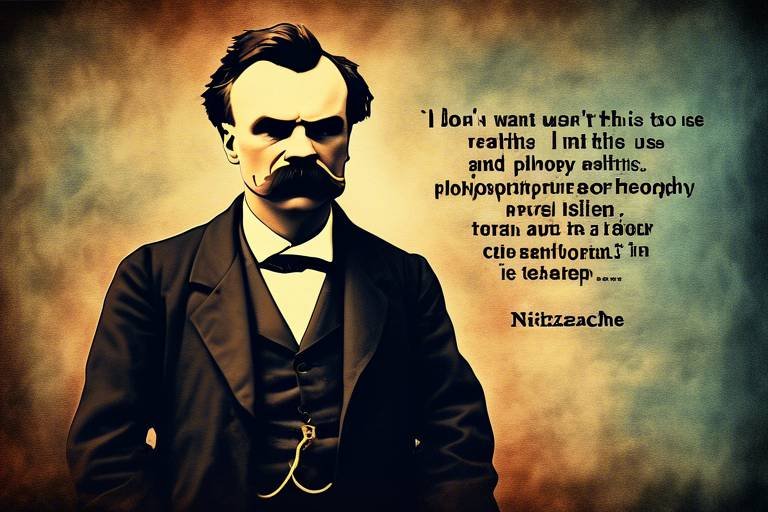Are Philosophical Ideas Absolute?
Philosophical inquiry often leads us down a rabbit hole of questions, each more profound than the last. One of the most intriguing questions that arise is whether philosophical ideas are absolute or merely constructs shaped by our experiences and context. The very essence of philosophy is to challenge our understanding of truth, knowledge, and morality, making the exploration of these ideas not just an academic exercise but a deeply personal journey.
To grasp the concept of absoluteness in philosophy, we must first understand that philosophical ideas are not static; they evolve over time and are influenced by cultural, historical, and personal factors. Imagine trying to capture a river in a bottle; the water keeps flowing, changing its form and direction. Similarly, philosophical ideas flow through the currents of human thought, adapting and reshaping themselves as we seek to understand our existence. This fluidity raises the question: can we truly hold onto any idea as absolute when it is subject to the tides of time and context?
As we delve deeper into the nature of philosophical ideas, we encounter various schools of thought that have attempted to tackle the issue of absoluteness. Some philosophers assert that certain truths are universal and unchanging, while others argue that all knowledge is relative, shaped by individual perspectives and societal norms. This ongoing debate is not merely academic; it has real-world implications for how we approach ethics, governance, and interpersonal relationships.
In the following sections, we will explore historical perspectives on absolutism, examining the contributions of key philosophers like Plato, and how their ideas continue to influence contemporary discussions. We will also look at the tension between relativism and absolutism, particularly in the realms of ethics and language, as we seek to understand whether philosophical ideas can ever truly be absolute.
- What is the difference between absolute and relative philosophical ideas?
Absolute ideas are considered universal truths that remain constant regardless of context, while relative ideas are shaped by cultural, historical, or personal perspectives. - Can philosophical ideas change over time?
Yes, philosophical ideas are often subject to change as new insights and contexts emerge, reflecting the dynamic nature of human thought. - How do language and culture influence philosophical ideas?
Language and culture shape our understanding and interpretation of philosophical concepts, making it difficult to claim any idea as absolute.

The Nature of Philosophical Ideas
Philosophical ideas are like the ever-changing tides of the ocean; they ebb and flow, reflecting the complexities of human thought and experience. At their core, these ideas encapsulate profound questions about existence, knowledge, and morality. But can we really pin them down as absolute truths? The answer isn't straightforward. Just as a painter interprets a landscape in myriad ways, philosophers approach ideas from different angles, influenced by their cultural backgrounds, historical contexts, and personal experiences.
Understanding the nature of philosophical ideas is essential if we want to grasp whether they can be deemed absolute or if they are inherently subject to change. Think of philosophical ideas as a vast library, where each book represents a different perspective. Some books may contain timeless wisdom, while others might reflect the fleeting thoughts of a particular era. This dynamic nature leads us to consider the following:
- Evolution Over Time: Philosophical ideas are not static; they evolve as society and culture progress. What was considered a fundamental truth centuries ago may not hold the same weight today.
- Contextual Influences: The context in which an idea is formed plays a crucial role in its interpretation. For instance, the ethical principles of one culture may differ vastly from those of another, leading to varied philosophical conclusions.
- Personal Interpretation: Each individual brings their own experiences and biases to philosophical discourse, which can further alter the understanding of an idea.
Moreover, the interplay between different philosophical schools of thought adds another layer of complexity. Take, for instance, the dichotomy between rationalism and empiricism. Rationalists argue that knowledge is innate and can be accessed through reason, while empiricists contend that knowledge comes from sensory experience. This fundamental disagreement illustrates how philosophical ideas can diverge significantly, challenging the notion of absoluteness.
In essence, the nature of philosophical ideas is a tapestry woven from the threads of history, culture, and individual thought. As we explore these ideas, we must remain open to the possibility that what we consider absolute may just be a reflection of our current understanding, subject to reinterpretation as new perspectives emerge. In this way, philosophical inquiry becomes a journey, not a destination, inviting us to question, reflect, and engage with the world around us.

Historical Perspectives on Absolutism
Throughout the annals of history, the concept of absolutism has been a hotbed of philosophical debate, captivating the minds of thinkers across various eras. From ancient philosophers to modern theorists, the discourse surrounding absolute truths has evolved, revealing a rich tapestry of ideas and arguments. At its core, absolutism posits that certain truths exist independently of human perception or cultural context. This notion raises profound questions: Are there universal truths that transcend time and space? Or are all truths inherently subjective, shaped by the lens through which we view the world?
One of the most significant figures in this discourse is Plato, whose theory of Forms suggests that beyond our tangible reality lies a realm of unchanging and perfect ideals. According to Plato, these Forms represent the ultimate truth, a stark contrast to the ever-changing material world we inhabit. For instance, the Form of Beauty itself exists in a perfect state, while any beautiful object we encounter is merely a shadow of that ideal. This perspective invites us to ponder: if such absolute forms exist, can we ever truly grasp them in our flawed, subjective experiences?
However, not all philosophers agree with Plato's vision. Aristotle, Plato’s student, critiqued the theory of Forms, arguing that knowledge must be grounded in empirical observation. He believed that understanding comes from examining the world around us, rather than relying on abstract ideals. This divergence between Plato and Aristotle highlights a fundamental tension in philosophical thought: the struggle between idealism and empiricism. While Plato sought absolute truths in the realm of ideas, Aristotle grounded knowledge in the material world, suggesting that our understanding of truth is, in fact, contingent upon our experiences.
As we journey through history, we encounter other notable figures who have shaped the debate on absolutism. The Enlightenment period brought forth thinkers like Immanuel Kant, who proposed a synthesis of rationalism and empiricism. Kant argued that while our knowledge begins with experience, it is also shaped by the innate structures of our minds. This perspective suggests a complex interplay between subjective experience and the pursuit of objective truths, challenging the notion of absoluteness in a compelling way.
In the 20th century, philosophers such as Friedrich Nietzsche and Martin Heidegger further questioned the foundations of absolute truths. Nietzsche famously declared that "God is dead," signaling a departure from traditional moral absolutes and inviting a new era of existential thought. Heidegger, on the other hand, explored the nature of being and existence, suggesting that our understanding is always contextual and never fully absolute. These modern interpretations reflect a growing skepticism towards the idea of universal truths, emphasizing the significance of individual perspectives and cultural contexts.
To summarize the historical perspectives on absolutism, we can look at a table that encapsulates key philosophers and their contributions:
| Philosopher | Key Idea | Contribution to Absolutism |
|---|---|---|
| Plato | Theory of Forms | Proposed unchanging ideals as absolute truths. |
| Aristotle | Empiricism | Argued that knowledge is rooted in observation. |
| Immanuel Kant | Synthesis of Rationalism and Empiricism | Proposed that knowledge is shaped by both experience and innate structures. |
| Friedrich Nietzsche | Existentialism | Challenged traditional moral absolutes, emphasizing individual perspectives. |
| Martin Heidegger | Contextual Existence | Explored the nature of being, emphasizing the role of context in understanding truth. |
As we reflect on these historical perspectives, it becomes evident that the debate over the absoluteness of philosophical ideas is far from settled. Each philosopher adds a unique layer to the conversation, prompting us to continually re-evaluate our understanding of truth and knowledge. Are we closer to grasping absolute truths, or are we simply navigating a sea of subjective interpretations? The history of philosophical thought suggests that the quest for absoluteness is as complex and nuanced as the human experience itself.

Plato's Theory of Forms
Plato's Theory of Forms is a cornerstone of his philosophical thought, offering a profound perspective on the nature of reality. According to Plato, the physical world we perceive through our senses is merely a shadow of a higher, unchanging reality composed of abstract Forms. These Forms represent the true essence of all things, existing in a realm that transcends our material existence. For instance, consider the concept of beauty. While we may encounter numerous beautiful objects in our world, Plato would argue that they are all imperfect representations of the singular, absolute Form of Beauty itself.
This theory raises intriguing questions about the absoluteness of ideas. If Forms exist independently of our perceptions, then they can be seen as eternal truths that do not change over time. This notion suggests that philosophical ideas, much like mathematical truths, have an objective reality that remains constant regardless of individual beliefs or cultural contexts. In this way, Plato's Forms advocate for the existence of absolute ideas, challenging the relativistic views that emerged later in philosophical discourse.
However, to fully appreciate the implications of Plato's Theory, it's essential to examine its critiques. Many philosophers argue that the Forms are overly abstract and disconnected from the tangible world we inhabit. They posit that this separation leads to a lack of practical relevance, as it becomes difficult to apply these idealized concepts to everyday life. For example, how can we define justice as an absolute Form when its manifestations can vary significantly across different societies?
Despite these critiques, the influence of Plato's Theory of Forms persists in modern philosophical discussions. Contemporary thinkers often reinterpret these ideas, exploring their relevance in light of current debates about truth and knowledge. They examine whether the existence of such abstract entities can coexist with our understanding of a world that is inherently fluid and changeable.
In summary, Plato's Theory of Forms invites us to ponder the nature of reality and the possibility of absolute philosophical ideas. It challenges us to consider whether there are truths that exist independently of human interpretation and whether these truths can provide a foundation for our understanding of morality, beauty, and existence itself.

Critiques of Plato's Theory
Plato's Theory of Forms has been a cornerstone of philosophical thought for centuries, yet it is not without its critics. Many philosophers argue that the concept of abstract Forms is overly idealistic and detached from the tangible realities of the world we experience daily. For instance, how can we claim to understand the essence of beauty or justice when these concepts are so deeply influenced by individual perceptions and societal norms? Critics contend that Plato's separation of the material world from the world of Forms creates a chasm that is difficult, if not impossible, to bridge.
One prominent critique comes from the philosopher Aristotle, who argued that Plato's Forms lack empirical grounding. Aristotle believed that universals—like beauty or justice—cannot exist apart from the specific instances we observe in the world. He famously stated that "to say that there are such things as Forms is to say that there are things that are not." This perspective emphasizes the need for a more pragmatic approach to understanding philosophical ideas, one that recognizes the interplay between the abstract and the concrete.
Moreover, the idea of absolute truths as proposed by Plato raises significant questions about their applicability in real-life scenarios. For example, consider the concept of justice. If we adhere strictly to Plato's notion of an unchanging Form of Justice, how do we account for the diverse interpretations of justice that vary across cultures and contexts? This discrepancy leads to a critical examination of whether any philosophical idea can truly be deemed absolute when it is so heavily influenced by human experience.
Furthermore, critics argue that Plato's emphasis on abstract Forms can lead to a form of elitism in philosophical discourse. By prioritizing an ideal realm over lived experiences, Plato's theory risks alienating those who may not have the privilege or means to engage with such high-level abstractions. This raises an important question: should philosophy be accessible to everyone, or is it reserved for a select few who can grasp its complexities?
In summary, while Plato's Theory of Forms offers a compelling framework for understanding philosophical ideas, it is essential to consider the critiques that challenge its validity. The tension between the abstract and the concrete, the universal and the particular, invites ongoing dialogue about the nature of truth and knowledge. As we navigate these complexities, we must ask ourselves: can any philosophical idea truly be absolute, or are we forever caught in a web of relative interpretations?
- What is Plato's Theory of Forms?
Plato's Theory of Forms posits that non-material abstract forms, or ideas, represent the most accurate reality. According to this theory, the physical world is a mere shadow of the true essence of things.
- Why do critics challenge Plato's Theory?
Critics argue that the Theory of Forms is disconnected from the material world, lacks empirical support, and does not account for the diverse interpretations of concepts like justice and beauty across different cultures.
- How does Aristotle's view differ from Plato's?
Aristotle rejected Plato's notion of separate Forms, arguing instead that universals exist only within particular instances in the material world. He believed that understanding comes from observing and analyzing the physical reality around us.

Modern Interpretations
In the realm of philosophy, the interpretations of Plato's Theory of Forms have undergone significant evolution. Modern philosophers have taken these ancient ideas and reimagined them in various contexts, often aligning them with contemporary issues. For example, many argue that while Plato's Forms represent unchanging truths, the application of these ideas in real-world scenarios often reveals a more complex picture. The idea of absolute truths can be likened to a compass; while it points north, the terrain we traverse may be anything but straight. This metaphor highlights the challenges of applying seemingly absolute concepts to the multifaceted nature of human experience.
One of the most intriguing aspects of modern interpretations is the intersection with scientific advancements. In today's world, where data and empirical evidence reign supreme, some philosophers suggest that the rigid structure of Plato's Forms may not hold up against the fluidity of scientific theories and discoveries. As we delve deeper into quantum mechanics or the theory of relativity, the very nature of reality appears to shift, leading us to question whether any philosophical idea can truly be absolute when faced with the ever-changing landscape of knowledge.
Moreover, modern philosophers often emphasize the importance of context when discussing absoluteness. They argue that knowledge is not merely a collection of static truths but is deeply intertwined with cultural, historical, and social factors. This perspective aligns with the notion that while some ideas may strive for absoluteness, they are invariably colored by the lens through which we view them. For instance, consider the concept of justice: what is deemed just in one society may be perceived as unjust in another. This variability prompts a reevaluation of how we define and understand absolute philosophical ideas.
To illustrate the diversity of modern interpretations, let’s consider a few key philosophical movements that have emerged:
| Philosophical Movement | Key Ideas | Influence on Absolutism |
|---|---|---|
| Postmodernism | Rejects universal truths, emphasizing relative perspectives. | Challenges the notion of absolute ideas by promoting pluralism. |
| Pragmatism | Focuses on practical consequences and real-world applications. | Suggests that truth is not absolute but contingent upon utility. |
| Constructivism | Knowledge is constructed through social processes. | Argues that understanding is shaped by context, undermining absoluteness. |
These movements not only reflect a shift in philosophical thought but also challenge the traditional view of ideas as fixed and unchanging. In essence, modern interpretations invite us to reconsider the very foundation of philosophical inquiry. Are we seeking absolute truths, or are we better served by embracing a more dynamic approach to knowledge? This ongoing dialogue enriches our understanding of philosophy, making it a vibrant field that continues to evolve.
- What is the main idea behind Plato's Theory of Forms? Plato's Theory of Forms posits that there exists a realm of abstract Forms that represent the most accurate reality, which is separate from the material world.
- How do modern interpretations differ from traditional views of philosophical ideas? Modern interpretations often emphasize context, cultural influences, and the fluidity of knowledge, challenging the idea of fixed, absolute truths.
- What role does language play in shaping philosophical ideas? Language influences our understanding and interpretation of concepts, which can affect whether we see ideas as absolute or relative.
- Can ethical principles be considered absolute? This is a debated topic; while some argue for universal moral truths, others suggest that ethics are culturally relative.

Empiricism vs. Rationalism
When diving into the fascinating world of philosophy, one cannot ignore the age-old debate between empiricism and rationalism. These two schools of thought represent fundamentally different approaches to understanding knowledge and truth. At its core, empiricism asserts that knowledge comes primarily from sensory experience. Think of it like this: if you want to know whether a fruit is sweet, you wouldn't just theorize about it; you'd take a bite! This hands-on approach emphasizes observation and experimentation, making it a favorite among scientists and those who value tangible evidence.
On the other hand, rationalism posits that reason and intellect are the primary sources of knowledge. Rationalists argue that there are certain truths that are innate and can be understood through thought alone, without needing to rely on our senses. For instance, consider mathematical truths like 2 + 2 4; this is a truth that doesn’t require physical verification. It’s a classic case of using reason to arrive at knowledge. The rationalist perspective suggests that our minds possess inherent structures that shape our understanding of the world.
To better illustrate the differences between these two viewpoints, let's take a look at the following table:
| Aspect | Empiricism | Rationalism |
|---|---|---|
| Source of Knowledge | Sensory experience | Reason and intellect |
| Methodology | Observation and experimentation | Logical deduction and reasoning |
| Example | Scientific experiments | Mathematical proofs |
Now, what happens when these two philosophies clash? Well, the debate often centers around the question of whether knowledge can be considered absolute. Empiricists would argue that since our senses can deceive us, any knowledge derived from them is inherently provisional. In contrast, rationalists might counter that certain truths are universal and unchanging, regardless of sensory experience. This tug-of-war raises intriguing questions about the nature of knowledge itself: Can we ever truly know something for certain, or is all understanding subject to change?
Moreover, this dichotomy has significant implications for the way we perceive philosophical ideas. If we lean towards empiricism, we may view philosophical concepts as fluid and adaptable, shaped by cultural and contextual factors. Conversely, a rationalist view might lead us to believe in fixed, absolute truths that transcend time and space. This interplay between empiricism and rationalism not only enriches philosophical discourse but also challenges us to reflect on our own beliefs about knowledge and truth.
In conclusion, the debate between empiricism and rationalism is not just an academic exercise; it’s a lens through which we can examine our understanding of the world. As we navigate through life, we often find ourselves oscillating between these two approaches, seeking a balance between sensory experience and rational thought. The question remains: in the quest for knowledge, can we ever achieve a truly absolute understanding, or are we forever at the mercy of our perceptions and reasoning?
- What is empiricism? Empiricism is the philosophical belief that knowledge comes primarily from sensory experience.
- What is rationalism? Rationalism is the view that reason and intellect are the primary sources of knowledge, independent of sensory experience.
- Can knowledge be absolute? The debate between empiricism and rationalism raises questions about whether knowledge can be considered absolute or is subject to change.
- How do empiricism and rationalism influence philosophy? These two perspectives shape the way we understand knowledge and truth, affecting various philosophical discussions and theories.

Relativism in Philosophy
Relativism is a fascinating concept in philosophy that challenges the notion of absolute truths. At its core, relativism posits that knowledge and truth are not universal but rather contingent upon various factors, such as cultural, historical, or personal contexts. This perspective invites us to consider the nuances of human experience and the diverse interpretations that arise from it. Have you ever noticed how different cultures perceive the same event in vastly different ways? This is a prime example of how relativism operates in our everyday lives.
One of the most compelling aspects of relativism is its ability to highlight the limitations of our own viewpoints. For instance, consider how a moral belief held in one society may be viewed as completely unacceptable in another. This variability raises significant questions about the absoluteness of ethical principles. Can we truly claim that certain moral truths are universal, or are they simply reflective of the context in which they arise? To illustrate this, let's take a look at some examples:
| Cultural Context | Example of Moral Belief | Relativist Perspective |
|---|---|---|
| Western Culture | Individual rights are paramount. | Rights are seen as universal; however, they may not apply in every cultural context. |
| Collectivist Cultures | Community welfare takes precedence over individual desires. | Emphasizes the importance of the group over the individual, challenging Western ideals. |
In light of these examples, it's crucial to understand that relativism does not necessarily imply that all beliefs are equally valid. Instead, it encourages a deeper exploration of why certain beliefs exist and how they are shaped by their respective contexts. This is particularly evident in ethical relativism, which suggests that moral truths can vary significantly across cultures. For instance, practices that are considered morally acceptable in one culture may be viewed as reprehensible in another. This leads to a rich tapestry of moral beliefs, each with its own justification.
However, the discussion around relativism is not without its challenges. Critics argue that ethical relativism can lead to moral nihilism, where no action can be deemed right or wrong. This perspective raises the question: if everything is relative, how do we navigate moral dilemmas? It’s a complex issue that invites us to think critically about our own values and the foundations upon which they are built.
In conclusion, relativism in philosophy offers a compelling lens through which to examine our understanding of truth and morality. By acknowledging the influence of context on our beliefs, we can foster a more inclusive dialogue about the diverse perspectives that exist in our world. So, the next time you encounter a differing viewpoint, consider how cultural and historical contexts might shape that perspective. It might just open your eyes to a whole new way of thinking!
- What is relativism in philosophy? Relativism is the idea that knowledge and truth are not absolute but depend on cultural, historical, or personal contexts.
- How does ethical relativism differ from moral absolutism? Ethical relativism suggests that moral truths vary across cultures, while moral absolutism holds that there are universal moral principles applicable to all individuals.
- Can relativism lead to moral nihilism? Yes, critics of relativism argue that if all beliefs are equally valid, it can lead to a lack of accountability for actions.
- How does language influence relativism? Language shapes our understanding and interpretation of concepts, which can affect how we perceive truth and morality.

Ethical Relativism
Ethical relativism is a fascinating concept that suggests that moral truths are not universal but rather vary across different cultures and societies. Imagine standing on a bridge, looking down at a river that flows through various landscapes; each bend in the river represents a different set of moral beliefs shaped by cultural contexts. This perspective argues that what is considered right or wrong can change based on societal norms, traditions, and historical circumstances. For instance, practices that are deemed acceptable in one culture may be viewed as morally reprehensible in another, leading to a rich tapestry of ethical frameworks that reflect human diversity.
One of the core arguments in favor of ethical relativism is that it promotes tolerance and understanding. By recognizing that different cultures have their own moral codes, we can foster a more inclusive dialogue about ethics. However, this view does not come without its challenges. Critics argue that if all moral beliefs are equally valid, it becomes difficult to criticize harmful practices, such as discrimination or violence, that may be culturally accepted. This raises a crucial question: Can we truly uphold the idea of ethical relativism while advocating for universal human rights?
To illustrate the complexity of ethical relativism, consider the following examples:
- Cultural Practices: Some cultures may practice arranged marriages as a norm, while others may advocate for individual choice in romantic relationships. Both practices are rooted in their respective cultural values.
- Dietary Restrictions: In certain religions, consuming pork is strictly forbidden, while in others, it is a common dietary choice. These differing beliefs highlight how ethics are influenced by cultural backgrounds.
As we delve deeper into ethical relativism, it's essential to acknowledge its implications on moral philosophy. The idea challenges us to rethink our assumptions about what is right and wrong. It invites us to engage in a more profound exploration of our ethical beliefs and encourages a dialogue that respects diverse perspectives. However, it also compels us to confront the potential dangers of moral relativism, where anything goes, and where harmful practices could be justified under the guise of cultural acceptance.
In conclusion, ethical relativism serves as a reminder of the complexity of human morality. It prompts us to consider how our own beliefs are shaped by our experiences and environments. While it fosters understanding and respect for cultural differences, it also challenges us to find a balance between cultural relativism and the pursuit of universal ethical standards. The ongoing debate about ethical relativism will undoubtedly continue to shape philosophical discussions and influence how we understand morality in an increasingly interconnected world.
- What is ethical relativism? Ethical relativism is the view that moral principles are not universal and can vary based on cultural, historical, or personal contexts.
- How does ethical relativism promote tolerance? By acknowledging diverse moral beliefs, ethical relativism encourages understanding and respect for different cultural practices.
- Can ethical relativism justify harmful practices? Critics argue that ethical relativism can lead to the justification of harmful actions if they are culturally accepted, raising concerns about universal human rights.
- What are examples of ethical relativism? Examples include varying cultural practices such as dietary restrictions and marriage customs, which highlight the diversity of moral beliefs.

Challenges to Relativism
While relativism presents a compelling argument that knowledge and truth are shaped by cultural, historical, or individual contexts, it is not without its challenges. Critics argue that if all truths are relative, then the concept of truth itself becomes meaningless. Imagine a world where every belief holds equal weight; it would lead to a chaotic landscape where no one could agree on anything fundamental. This raises a significant question: Is there a foundation upon which we can build universal truths?
One of the primary challenges to relativism is the idea of universal moral truths. Many philosophers argue that certain ethical principles transcend cultural boundaries. For instance, concepts like justice, fairness, and human rights are often viewed as universal values that should apply to all individuals, regardless of their cultural background. This perspective suggests that while practices may differ, the underlying ethical principles can remain constant. To illustrate this, consider the following table that contrasts universal ethics with relativistic views:
| Aspect | Universal Ethics | Relativistic Ethics |
|---|---|---|
| Definition | Ethical principles that apply to all humans | Ethical principles vary by culture |
| Examples | Human rights, justice | Honor codes, cultural practices |
| Implications | Promotes global standards | Encourages cultural tolerance |
Another significant challenge comes from the realm of logical consistency. If relativism claims that all beliefs are equally valid, then it must also accept its own assertion as merely one of many equally valid viewpoints. This leads to a paradox: if relativism is true, then it cannot be universally true, thus undermining its own validity. This logical inconsistency is a powerful argument against the relativistic stance.
Moreover, proponents of universalism argue that certain truths—like the wrongness of torture or genocide—should be recognized universally, regardless of cultural context. They contend that allowing for relativism in these cases could lead to moral complacency, where heinous acts are justified based on cultural norms. This perspective emphasizes the need for a moral framework that transcends individual cultures and traditions.
In summary, while relativism offers valuable insights into the nature of knowledge and ethics, it faces substantial critiques that highlight the need for some level of universality in moral truths. The debate between relativism and universalism continues to shape philosophical discourse, prompting us to consider how we define truth and morality in an increasingly interconnected world.
- What is relativism in philosophy? Relativism is the idea that knowledge and truth are not absolute but are shaped by cultural, historical, or personal contexts.
- What are some challenges to relativism? Critics argue that relativism leads to logical inconsistencies and undermines the existence of universal moral truths.
- Can ethical principles be universal? Many philosophers believe that certain ethical principles, such as human rights, should apply universally despite cultural differences.
- How does language influence philosophical ideas? Language shapes our understanding and interpretation of philosophical concepts, which can affect whether we view ideas as absolute or relative.

The Impact of Language on Philosophical Ideas
Language is not just a tool for communication; it's a powerful lens through which we perceive and interpret the world around us. When it comes to philosophical ideas, the impact of language can be profound. Think about it: our thoughts are often shaped by the words we use. This raises the question: can philosophical ideas ever be truly absolute if they are influenced by the very language we speak? This is where the concept of linguistic relativity comes into play.
Linguistic relativity suggests that the structure and vocabulary of our language can influence our thought processes. For instance, consider how different cultures have unique words for concepts that others may struggle to define. The Inuit have multiple words for snow, each describing a different type or condition. This specificity allows them to perceive and interact with their environment in ways that speakers of other languages might not. This leads us to ponder: if our language shapes our understanding, how can we claim any philosophical idea is absolute?
Moreover, the relationship between language and meaning is crucial in philosophy. Different languages can lead to varying interpretations of the same philosophical concept. For example, the term "freedom" can carry different connotations in English, Spanish, and Mandarin. In English, it often implies individual autonomy, while in Spanish, it might encompass a broader sense of social responsibility. This divergence creates a rich tapestry of understanding but also complicates the quest for universal truths. As a result, the absoluteness of philosophical ideas becomes a matter of perspective, heavily influenced by linguistic context.
To illustrate this further, let's consider how language can shape ethical discussions. In philosophical discourse, words like "justice," "truth," and "morality" can have nuanced meanings across different cultures. Here’s a simple table that highlights some of these variations:
| Term | English Interpretation | Spanish Interpretation | Mandarin Interpretation |
|---|---|---|---|
| Justice | Individual rights and fairness | Equidad y derechos | 公正 (Gōngzhèng) - fairness in society |
| Truth | Objective reality | Verdad - subjective and objective | 真理 (Zhēnlǐ) - often seen as a consensus |
| Morality | Personal ethical standards | Ética - often collective | 道德 (Dàodé) - emphasizes social harmony |
This table highlights how the same philosophical concepts can be interpreted differently based on linguistic and cultural contexts. Such variations challenge the notion of absolute philosophical ideas, suggesting instead that our understanding is inherently relative. If we cannot agree on the meanings of fundamental concepts, how can we assert that any philosophical idea holds absolute truth?
In conclusion, the impact of language on philosophical ideas cannot be overstated. Our linguistic choices shape our thoughts, perceptions, and interpretations of complex concepts. As we navigate the philosophical landscape, we must acknowledge the role of language in shaping our understanding of truth, knowledge, and morality. This acknowledgment invites us to embrace a more nuanced view of philosophical ideas, recognizing that while some may strive for absoluteness, they are often colored by the rich diversity of human language and experience.
- What is linguistic relativity? Linguistic relativity is the idea that the structure and vocabulary of a language influence how its speakers perceive and think about the world.
- How does language affect philosophical ideas? Language shapes our understanding and interpretation of concepts, leading to variations in meaning and perspective across different cultures.
- Can philosophical ideas ever be absolute? The influence of language and cultural context suggests that many philosophical ideas are relative rather than absolute.

Language and Meaning
Language is not just a tool for communication; it’s a lens through which we perceive and interpret the world around us. Imagine trying to describe the taste of chocolate to someone who has never experienced it. No matter how eloquently you express its richness and sweetness, the listener's understanding is limited by their own experiences and the words available in their language. This illustrates a crucial point: our understanding of philosophical concepts is deeply intertwined with the language we use. The words we choose carry inherent meanings, but they also evoke emotions and cultural connotations that shape our thoughts.
When philosophers discuss concepts like truth, justice, or existence, they often rely on language that may not fully encompass the complexity of these ideas. For instance, the term "justice" can have different interpretations based on cultural context. In one society, it may imply strict adherence to laws, while in another, it might emphasize restorative practices. This variability in meaning leads to differing conclusions about whether these concepts are absolute or relative.
Furthermore, the relationship between language and meaning raises important questions about how we define philosophical ideas. Consider the following aspects:
- Semantic Variability: Words can change meaning over time and across cultures, making it difficult to pin down a single, absolute interpretation.
- Contextual Influence: The context in which a word is used can drastically alter its meaning, leading to misunderstandings or different philosophical interpretations.
- Metaphorical Language: Philosophers often use metaphors to illustrate complex ideas, but these metaphors can be interpreted in various ways, further complicating the notion of absoluteness.
Moreover, the concept of linguistic relativity suggests that the structure of a language affects its speakers' worldview and cognition. If our thoughts are shaped by the language we use, can we ever claim that philosophical ideas exist in an absolute form? This question is particularly relevant in a globalized world where multiple languages and cultures intersect, each bringing its own interpretations and meanings to philosophical discourse.
In conclusion, the interplay between language and meaning is a vital factor in understanding philosophical ideas. As we navigate through the complexities of language, we must remain aware of how it shapes our perceptions of truth and meaning. This awareness not only enriches our philosophical discussions but also challenges us to consider the limitations of our own understanding.
- What is the relationship between language and philosophical ideas?
Language shapes how we understand and articulate philosophical concepts, influencing our interpretations and conclusions. - Can philosophical ideas be absolute if they are influenced by language?
The influence of language raises questions about the absoluteness of ideas, suggesting that they may be more relative than we assume. - How does cultural context affect the meaning of philosophical terms?
Cultural context can lead to varying interpretations of philosophical terms, highlighting the complexity of achieving universal understanding.

Philosophical Implications of Linguistic Relativity
The concept of linguistic relativity, often associated with the Sapir-Whorf hypothesis, proposes that the language we speak influences the way we think and perceive the world around us. This idea raises intriguing questions about the nature of philosophical ideas and whether they can be considered absolute. If our understanding of concepts is shaped by the linguistic structures we use, how can we claim any philosophical idea to be universally valid? For instance, consider how different cultures might express the concept of time. In some languages, time is viewed as a linear progression, while in others, it is cyclical. This divergence in expression can lead to fundamentally different perceptions of reality.
When we delve deeper into the philosophical implications of linguistic relativity, we find ourselves questioning the very foundation of knowledge and truth. If language molds our thoughts, then the philosophical ideas that arise from those thoughts are, in a sense, contingent upon the linguistic frameworks available to us. This leads to the idea that what we consider to be absolute truths may actually be reflections of our specific linguistic and cultural contexts. For example, concepts like justice or freedom may carry different meanings across cultures, suggesting that their philosophical interpretations are not as fixed as one might hope.
Moreover, the implications of linguistic relativity extend beyond mere semantics. They challenge the notion of a single, objective reality that philosophical discourse often strives to uncover. If our languages shape our thoughts, then the essence of philosophical inquiry becomes a tapestry woven from diverse threads of cultural and linguistic experiences. This diversity can enrich philosophical discussions but also complicates the quest for universal truths.
To illustrate the impact of linguistic relativity on philosophical ideas, consider the following table that summarizes key differences in how various languages conceptualize space and time:
| Language | Concept of Time | Concept of Space |
|---|---|---|
| English | Linear (past, present, future) | Euclidean (fixed points) |
| Akan (Ghana) | Circular (events recur) | Relational (context-dependent) |
| Chinese | Both linear and cyclical (contextual) | Flexible (varies by context) |
This table highlights how the perception of time and space can vary significantly across cultures, leading to different philosophical interpretations. If a philosophical idea about existence is rooted in a specific linguistic context, it raises the question: can it truly be considered absolute? The implications are profound, suggesting that our philosophical frameworks may be as fluid and dynamic as the languages we speak.
Ultimately, the philosophical implications of linguistic relativity compel us to reconsider our understanding of truth and knowledge. They invite us to embrace a more pluralistic view of philosophy, one that acknowledges the richness of diverse perspectives while recognizing the limitations imposed by our linguistic constructs. In doing so, we may find that rather than seeking absolute truths, the goal of philosophical inquiry could be to foster dialogue and understanding across cultures, celebrating the myriad ways in which we interpret existence.
- What is linguistic relativity? Linguistic relativity is the idea that the language we speak shapes our thoughts and perceptions of the world.
- How does linguistic relativity affect philosophical ideas? It suggests that philosophical concepts may vary across cultures and languages, challenging the notion of absolute truths.
- Can philosophical ideas be universal? While some ideas may resonate across cultures, linguistic relativity implies that many concepts are context-dependent.
- What is the Sapir-Whorf hypothesis? This hypothesis posits that the structure of a language affects its speakers' worldview and cognition.
Frequently Asked Questions
- What are philosophical ideas?
Philosophical ideas are complex concepts that explore fundamental questions about existence, knowledge, values, and reason. They often evolve over time as thinkers build upon or challenge previous notions, making them a fascinating area of study.
- Are philosophical ideas absolute or relative?
This is a hotly debated topic! Some philosophers argue that certain ideas, like moral truths, can be absolute, while others suggest that they are relative, shaped by cultural or personal contexts. It really depends on the philosophical framework you're examining.
- What is Plato's Theory of Forms?
Plato's Theory of Forms posits that non-material abstract forms represent the most accurate reality. According to him, these forms are unchanging and perfect, which raises interesting questions about the absoluteness of ideas compared to our imperfect material world.
- What critiques exist against Plato's Theory?
Critics argue that Plato's Forms are too abstract and disconnected from the real world. They advocate for a more pragmatic approach, suggesting that ideas should be grounded in our tangible experiences rather than lofty, unchanging ideals.
- How do empiricism and rationalism differ?
Empiricism emphasizes knowledge through sensory experience, while rationalism values reason and innate ideas. This fundamental difference influences how each school of thought perceives the absoluteness or relativity of philosophical concepts.
- What is ethical relativism?
Ethical relativism is the view that moral truths are not universal but vary across cultures and societies. This perspective challenges the idea of absolute ethical principles, raising questions about how we can determine right from wrong in a diverse world.
- What are the challenges to relativism?
Critics of ethical relativism argue that there are universal moral truths that apply regardless of cultural differences. These counterarguments aim to defend the existence of absolute ethical standards, suggesting that some moral principles transcend cultural context.
- How does language affect philosophical ideas?
Language plays a crucial role in shaping our understanding of philosophical concepts. Different linguistic frameworks can lead to varying interpretations, which may influence whether ideas are seen as absolute or relative.
- What is linguistic relativity?
Linguistic relativity is the idea that the language we speak influences our thought processes. This raises intriguing questions about whether philosophical ideas can ever be truly absolute if they are shaped by the nuances of language.



















